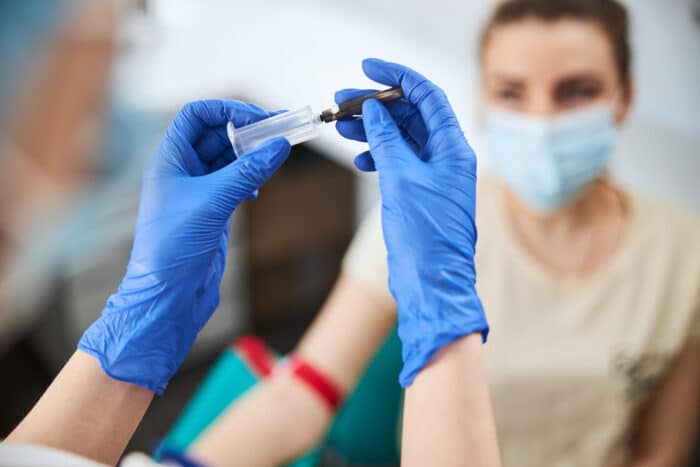Are you interested in the rewarding career of phlebotomy?
Or are you an aspiring phlebotomist, confused about which phlebotomy certification to choose from?
We understand your dilemma, which is why in this article, we aim to clear all such doubts and more.
Phlebotomy is a dynamic career that doesn’t require years of schooling and spending thousands on tuition fees.
Phlebotomists are healthcare professionals who are considered to be crucial to the medical team since their main role is to draw blood from patients for diagnosis.
In this article, we will also uncover if getting a phlebotomy certification is really necessary.
Let’s get started.
Read: What is a Phlebotomist
What is a Phlebotomy Certification? And is it necessary?
Before diving into the different types of phlebotomy certifications, you might be curious about what a phlebotomy certification is. Let’s explore.
A phlebotomy certification is like a badge you get after you sit and clear a phlebotomy certification exam. Clearing a phlebotomy certification exam makes you a certified phlebotomist, which is appealing to most employers.
These certification exams are offered by various authorized organizations, such as the American Society for Clinical Pathology (ASCP) and the National Healthcareer Association (NHA).
Now, getting certified as a phlebotomist is not necessary for most states, however, it is generally preferred by employers. This is because getting your certification means you passed a certifying exam, which shows your capability of handling everyday tasks for a phlebotomist.
Since phlebotomists take blood from patients, they need to be careful and good at their job, and being certified proves that you have the necessary skills.
Also see: How to Become a Phlebotomist

Do You Want To Become a Phlebotomist? Check Out Free Phlebotomist Masterclass!
In our masterclass you learn:
- How to be a Phlebotomist faster…in just 2 months!
- Avoid student debt & driving to classes
- #1 thing employers want from Phlebotomists
- How to stand-apart & get a university certificate for a strong resume
What are the Different Types of Phlebotomy Certifications?
The most important step in becoming a certified phlebotomist is to obtain certification. There are many types of phlebotomy certifications available, and it is important to choose the one that suits your interests and goals best.
We know this might be confusing, and that’s why we have made a simplified list of the different types of phlebotomy certifications that you can choose from.
See: Phlebotomist Skills
Let us take a look:
Certified Phlebotomy Technician (CPT)-
The Certified Phlebotomy Technician (CPT) certification is the most recommended and a good starting point for the career since it helps in entering the workforce quicker.
This certification is offered by national organizations such as the National Healthcareer Association (NHA) and the American Medical Technologists (AMT) and covers the basics of blood collection, venipuncture and skin puncture techniques, and safety protocols.
See: How Long Does it Take to Become a Phlebotomist
Phlebotomy Technician (PBT)-
The Phlebotomy Technician (PBT) certification is the next most recommended certification after CPT since it is also considered to be a step above and is recognized by many healthcare institutions.
This certification is recognized internationally and is offered by the American Society for Clinical Pathology (ASCP). This exam is a little more advanced than CPT and covers topics such as advanced venipuncture techniques, and handling special cases such as pediatric or geriatric patients.
This certification is often considered by aspiring phlebotomists who want to advance further in phlebotomy.
Donor Phlebotomy Technician (DPT)-
The Donor Phlebotomy Technician (DPT) certification is specialized for those who want to work in the field of blood donation and collection. Clearing this certification exam will make you capable of handling blood collection from donors, in either mobile blood drives or blood donation centers.
The certification typically includes training on the proper techniques for drawing blood, ensuring donor safety, and handling blood collection equipment. DPT certification is designed to ensure that individuals performing these important tasks are well-trained and capable of maintaining a safe and efficient blood donation process.
This certification is offered by the ASCP and the National Center for Competency Testing (NCCT).
Limited Phlebotomy Technician (LPT)-
The Limited Phlebotomy Technician (LPT) certification is for individuals who want to perform a restricted set of blood collection tasks. Unlike a full phlebotomy certification, which covers a wide range of blood collection procedures, this certification is for those who only need to draw blood for specific purposes, such as particular medical tests.
The scope of practice and limitations of this certification can vary by state and program, but it typically allows individuals to perform specific blood collection procedures within defined boundaries. LPTs are generally trained to collect blood only via skin puncture techniques, for example, fingersticks.
This certification is generally offered at the state level, so it is recommended to check your state’s health department or health agency to know which organization offers the LPT certification.
Registered Phlebotomy Technician (RPT)-
The Registered Phlebotomy Technician (RPT) certification is one of the most extensive and all-inclusive certifications in the field of phlebotomy.
This certification includes a variety of subjects, ranging from venipuncture (blood drawing from veins) to arterial puncture (blood collection from arteries) and the proper handling of specimens.
RPT-certified professionals are usually in high demand within the healthcare sector, working in hospitals, medical clinics, and diagnostic laboratories.
The RPT certification is offered by several organizations, such as the ASCP, NHA, and AMT.
Conclusion
Understanding the different types of phlebotomy certifications is crucial for anyone aspiring to pursue a career in this field. Each certification offers unique benefits and opportunities, catering to a wide range of preferences and career goals.
It’s important to research and choose the certification that best suits your needs, educational background, and future career aspirations. Ultimately, earning a phlebotomy certification can open doors to a rewarding and in-demand healthcare profession, where you can make a positive impact on patient care and well-being.
Related Resources:
- Day in the Life of a Phlebotomist
- Can A Phlebotomist Start IVs?
- What is the Main Responsibility of a Phlebotomist?
- Which Two Skills are Important for a Phlebotomist?
- What Do You Need To Be a Phlebotomist?
- Pros and Cons of Being a Phlebotomist
- Mobile Phlebotomist
- How Long Does it Take to Get a Phlebotomy Certification?
- What Jobs Can I Get With a Phlebotomy Certificate?
- Phlebotomist vs CNA
- Therapeutic Phlebotomy
- Certified Phlebotomy Technician
- Phlebotomy Classes
- Online Phlebotomy Classes
- Order of Draw Phlebotomy
- Phlebotomy Internship
- 4-Week Phlebotomy Classes Online
Related Articles
-
How to Be Successful in College in 2022 – 7 Simple Tips to Succeed
-
How Do Scholarships Work? Read This First…Truth is Shocking
-
7 Best College Majors 2024: What Should I Major In?
-
How to Choose a College – 10 Things You Must Consider in 2024
-
Why Go to College? Top 13 Benefits for Adult Students in 2022
-
Top 5 Best Alternatives to Community College for 2024








